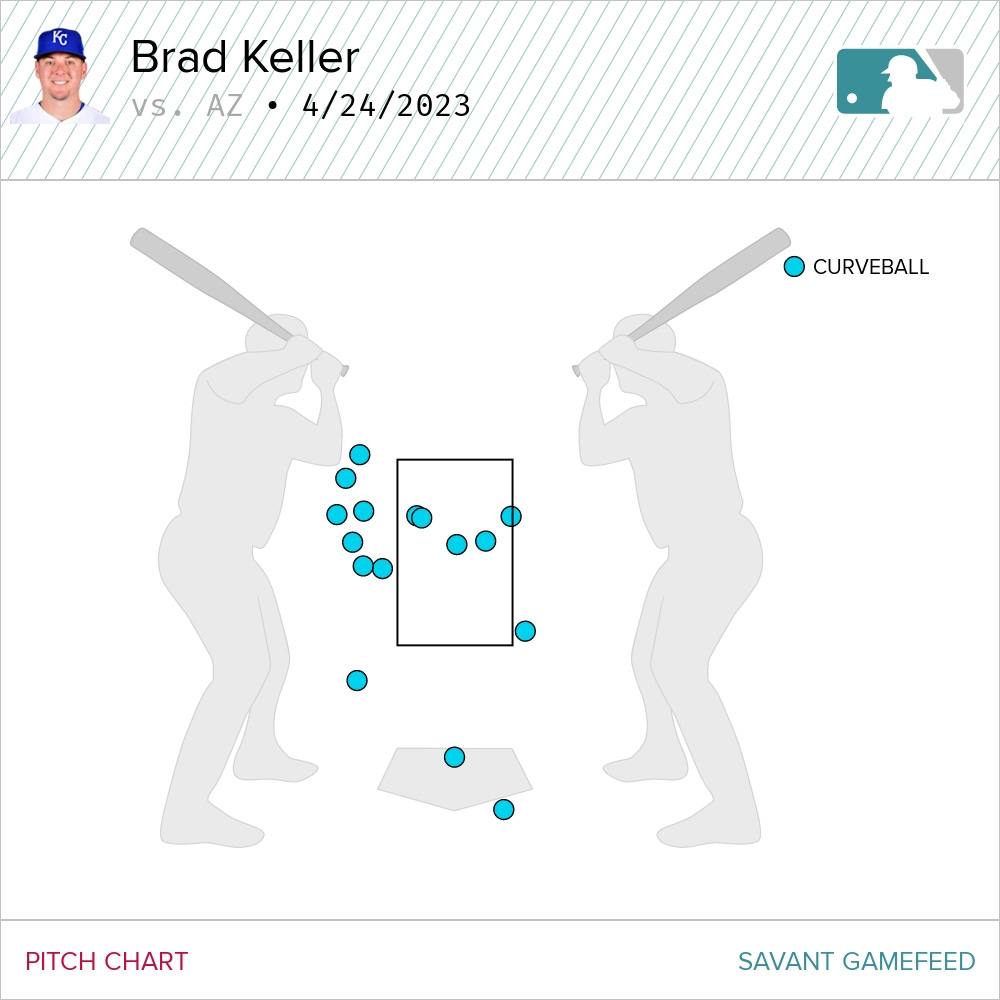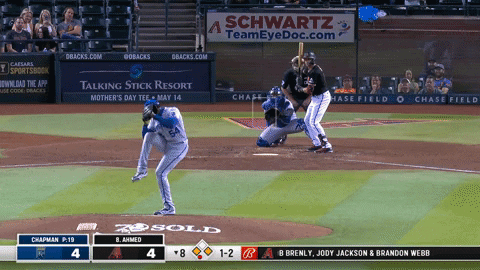Out of Control
Brad Keller simply couldn't throw strikes against a team that is extremely difficult to walk.
Raid the zone. That’s the mantra of this pitching staff. And, for the most part, they’ve been better. We’ve seen some blips this year from Dylan Coleman and surprisingly Scott Barlow out of the bullpen, but Brad Keller has been one of the biggest culprits this year. Just to show how big of a drain he’s been on this staff from a walk perspective, he now has a 17.6 percent walk rate while the rest of the team is sitting at 7.4 percent. That’s…not good. And the walks ultimately did the Royals in with the last coming from not Keller, but his six were a huge issue.
Upgrade to a paid subscription today to be eligible to win two tickets plus parking to Lorenzo Cain’s retirement party on May 6! Paid subscribers are able to comment and are eligible for all giveaways all year long.
It’s one thing to have some struggles throwing strikes against a team like the Rangers, who he walked five against his last time out. They came into yesterday with the 10th-best walk rate. But the Diamondbacks, for as young and fun as they are, don’t like to take the free pass. They came into last night with the lowest walk rate in baseball at 5.3 percent. They had walked 0 or one time in 12 of their first 23 games. They’d walked more than three times just four times all season long and more than four times just three times.
But Keller walked the first batter he faced. While he made up for it almost immediately with a tailor-made double play, he wasn’t done. He walked Lourdes Gurriel Jr. to lead off the second. You never want a leadoff walk, but that was Gurriel’s 84th plate appearance of the season and his second walk. Gurriel has a well below-average chase rate, but Keller couldn’t get him to bite on any of these pitches.
And no, the umpire didn’t do him any favors with a tight zone, but the Diamondbacks might be showing the book on Keller and it’s to take pitches and let him beat himself. The Rangers adjusted in a big way against his curve from a start where he pitched extremely well against them to spitting on his curve. And in this outing, Keller got a swing on just nine percent of his curves that were out of the zone. The last two starts are now his two lowest swings on pitches outside the zone on the curve out of his five starts. It’s certainly a trend worth watching.
It wasn’t just the curve, though. Keller threw 95 pitches and just 51 strikes with just six of them swinging. His slider wasn’t getting any reaction from the Diamondbacks either. He rebuilt his repertoire with the idea of getting swings and misses, but he might need to change his plan moving forward and get in the zone a little bit more.
Here are all the sliders he threw:
And here are all the curves:
I think the curves just didn’t really do much for him because they all seemed to miss arm side outside of the few that caught way too much of the plate. But on the sliders, I don’t think the location was generally too bad. There were a couple that I thought were surprising takes given the Diamondbacks proclivity for swinging, so I stand by my thought that he maybe needs to catch more of the zone with it in order to give hitters something to think about. Brady Singer, tonight’s starter, is a great example of throwing more in the zone to get more swings and misses. I theorized last season that the lack of swings on pitches outside the zone for the team as a whole was that they weren’t throwing enough strikes to lead to those.
But regardless of the fix, we’re now five starts into the latest Keller experiment. And it’s one that I was getting excited about during spring training, mostly due to scouting reports I was given. He’s had one average start, one good start, one great start and two clunkers. The clunkers are back-to-back and, honestly, could have been way worse, but they just weren’t good enough. He’s now walked 11 batters in eight innings with just four strikeouts. That doesn’t work. I don’t care if he only gives up seven hits if he has a 2.25 WHIP. Keller finds himself lucky that there aren’t other options right now.
Daniel Lynch just threw two innings in extended spring training over the weekend. He’s still at least two weeks away and probably more like three or four. Jonathan Heasley did finally have a good start, but he was so bad this spring and to start the year that I don’t think you can call him up. Drew Parrish has been good and Kris Bubic’s injury is an easy 40-man move, so I guess that’s possible. Austin Cox has also been pretty good, but I’m not sure either he or Parrish is on the radar just yet.
In AA, Jonathan Bowlan has struck out 12 and walked one in 8.1 innings but he’s been bad and is currently hurt. Alec Marsh has been good, but I think the Royals want him to have some more success after his rough year last year. I’d be very interested to see Anthony Veneziano, who has struck out 19 and walked one in 15 innings but he had a 5.72 ERA in AA last season, so I’m not entirely sure the Royals want to count on him to be a part of the solution just yet. So I do think there’s depth to be found later in the year, but right now, they’re going to need to stick with Keller for the time being. So hopefully he can figure some things out.
It wasn’t only Keller that was the problem last night. A team doesn’t start 5-18 with one issue a game, that’s for sure. The offense, as has been the case most of the year, contributed quite a bit as well. Yes, they scored four runs for just the eighth time this year in 23 games, but they continued to struggle to plate as many runs as possible. The scoring started for them with the second batter when Edward Olivares absolutely jumped on the first pitch he saw.
Then after Keller gave up two in the second, the Royals got another with a Vinnie Paquantino double followed by a Salvador Perez single to tie it up. After Keller gave up two more in the bottom of the third, the Royals started chipping away, but they missed out on big innings. I don’t know how many times I’ve gone through the Royals missed chances in the two seasons and 23 games I’ve been writing this newsletter, but let’s do it again.
The top of the fifth was probably the worst culprit. The Royals started the inning with back-to-back walks and then had a single and a double. They ended the inning scoring just one run. How is that possible? Well, Bobby Witt Jr. started things with a walk but got himself picked off. So when Olivares followed with a walk, there was one out already. The single got him to second and the double scored one but Franmil Reyes and Michael Massey grounded out.
Then in the top of the eighth, the Royals got a one-out single from Massey and then a walk from Nicky Lopez, pinch hitting for Matt Duffy. Kyle Isbel came through with a first-pitch single to put runners on first and second with one out, but Jackie Bradley Jr. struck out looking and Witt had one of his least competitive at bats I’ve seen him have. He got beaten by a 93 MPH fastball because he was probably looking for a slider before he swung at two sliders that were never strikes.
Aroldis Chapman got the bottom of the eighth and he’s been unreal this season, but he walked Christian Walker, who was pinch hitting and then gave up a single to Gabriel Moreno and a little squibber to Nick Ahmed to give the Diamondbacks a lead they wouldn’t give back in the ninth.
Both teams missed out on a bunch of chances. I think you could argue that either team feels like they should have been winners in a blowout, but neither team was and the Royals were the only ones who lost in the end. Again.
The walks were what did it. They walked eight hitters overall and four of them scored in a game they lost 5-4. The Diamondbacks walked five Royals and only one of them scored. There’s the simple difference. It reminded me of a basketball game when one team makes its free throws and the other doesn’t and the team making the free throws wins by two. It’s nice to see the resiliency again that they’ve shown on this road trip, but this is getting really old.









For a large majority of games this season, RISP has stood for Royals Insist on Stranding People. Monday night vs Arizona continued that trend with only a very occasional exception.
I hope you're right David, I truly do. But we all know it's easy to isolate numbers that appear to support a particular position when the preponderance of evidence points in the opposite direction. (The eminent economist Thomas Sowell called these "Aha! statistics.")
Given how guys like Keller and Singer have performed in their last few starts, I find myself unconvinced that "these strides" are really the kind of strides we all would like to see.